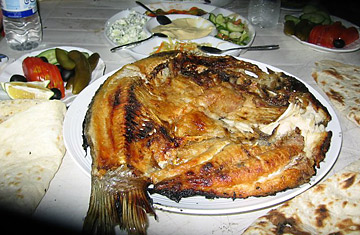
A dinner of roasted carp, on the banks of the Tigris River in Baghdad
Part 3 of TIME's Return to Baghdad series.
I don't think Nate Rawlings' expectations of this assignment included an evening on the banks of the Tigris, sucking on a hookah, feasting on flame-roasted river carp and watching Iraqi families picnic in the riverside park. Of the hundreds of thousands of American soldiers who have rotated through Iraq, only a handful could have experienced this, and that would have been in the first heady weeks in 2003 after the fall of Saddam Hussein.
But this was the second time I found myself introducing an American soldier to the dubious pleasure of masgouf, as locals call the roasted fish. The first occasion was in the week after Saddam's fall, and it took place right here on Abu Nuwas Street, Baghdad's once grand corniche on the Tigris. The carp in question was pilfered from the dictator's personal pond.
My driver at the time had made his way to Saddam's palace near the airport — it would later become the headquarters of the coalition forces in Iraq — and netted a giant fish from the artificial pond, where the fish were raised exclusively for the presidential kitchen. Local lore had it that Saddam's fish were reared on milk-soaked bread and crumbled hard-boiled eggs, which made them extra-delicious.
We brought the fish to the owner of a masgouf joint on Abu Nuwas Street, and when he learned of its provenance, he agreed to open his restaurant for us, providing he could join us. A handful of TIME staffers gathered for the feast in the dark: there was no electricity. We could hear gunfire and explosions from distant neighborhoods. It took an hour to roast the fish on an open flame, and we killed the time fantasizing with our Iraqi colleagues about one day opening a grand restaurant somewhere downriver, where we'd match the carp to appropriate wines.
When the fish was ready, we gathered around a dirty plastic table and solemnly scooped bits of blackened flesh in pieces of bread and then ate the dictator's dinner. It was a disappointment: the fish was fatty, and the bread lumpy. But the knowledge that this carp had been intended for Saddam's plate made it, in an odd sort of way, delicious.
Our whoops of delight attracted a patrol of U.S. soldiers, who came over to investigate. Naturally, we offered them a taste. Only one soldier took us up on it, and he chewed very, very slowly. It was, he allowed, better than the MREs (meals ready to eat) that they'd been eating for several weeks. But he didn't try a second bite.
It would be more than five years before I could return to Abu Nuwas Street: the U.S. military restricted access to the corniche, lest militants use it to mount attacks on the Green Zone across the river. When the Iraqi government reopened it in the fall of 2007, it was with great fanfare: the park was spruced up, and new restaurants opened. But the event was greeted by most Baghdadis with an ironic shrug. Who, they asked, would care to picnic on the river while their city was still wracked by sectarian violence? My colleagues and I shared this skepticism.
Not anymore. As Rawlings and I enjoyed our masgouf (it was much better than Saddam's), we marveled at the teeming crowds in the park. There's still plenty to fear in Baghdad, including the real possibility that the worst of the violence may return. But for the moment, Abu Nuwas Street is a welcome respite from the heat and dust of the city. For that, Rawlings and I — and hundreds of Iraqis — are grateful.
